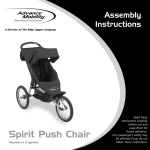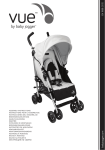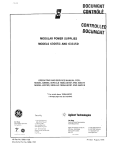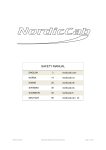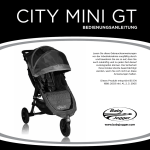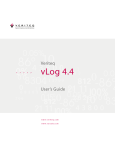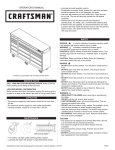Download ASSEMBLY INSTRUCTIONS
Transcript
Assembly instructions for Tailwind Trailer and Switchback Trailer Hybrid 1 Amazing Quick Fold System 2 1 1 2 2 3 (patented) 3 3 Switchback Trailer/Hybrid These products comply with ASTM F1975-02 Tailwind Trailer Read these instructions carefully before use and keep them for future reference. Your children’s safety may be affected if you do not follow these instructions. Safety GuidElines • WARNING: Avoid serious injury from falling or sliding out. Always use safety harness(es). •W ARNING: Do not use with children who exceed the weight limitations. • Always use the crotch strap(s) in combination with the waist belt(s). • WARNING: Do not use cleaning solvents; clean only with mild soap and water • WARNING: Securely attach hitch and safety strap prior to use. Failure to do so can cause an accident and result in a serious injury. • CAUTION: Allow extra clearance when making turns, wide turning radius is required. Do not turn sharply. • WARNING: Do not install a car seat or any other seating device not approved by the manufacturer inside this trailer. • This unit sits one to two passengers. When used with one passenger, the passenger must be seated in the center position. • WARNING: Make no modifications to this trailer. • Always use flag for increased visibility. • WARNING: Do not allow any of the child’s body, clothing, shoe laces, or toys to come in contact with moving parts. • WARNING: Never leave child unattended in the trailer. • WARNING: A reflector that complies with CPSC regulations shall be visible on the rear of the trailer. • WARNING: Before each ride, ensure the attached trailer does not interfere with braking, pedaling, or steering of the bicycle. • WARNING: Never ride bicycle at night without adequate lighting. Obey all local legal requirements for lightning. Failure to comply with the manufacturer’s instructions can lead to serious injury or death of the passenger/rider. • Make sure your bicycle brakes work properly. Braking distance is increased when pulling a trailer. • Maximum weight capacity – 100lbs (45 kg) (combined passenger(s) and baggage weight.) • Not for use at high speed, do not exceed 10mph. Slow down to less than 6 mph around corners. • Children must be at least 12 months and able to sit upright unassisted to ride in trailer. • Passenger must wear a CPSC or CE approved bicycle helmet when riding in trailer. • Check tire pressure before each use. Refer to the number on the tire wall for the optimum tire pressure for your tires. • We strongly recommend that the bicycle on which the trailer will be attached to, undergo a safety check by a qualified bicycle mechanic before attaching the trailer to it. Frame 2 Before unfolding trailer frame, you will need to unsnap storage straps on both sides. These are located near the trailer handle. 1 S et wheels aside for now. 3 Flip trailer frame so handle is laying on top. 4 Pull handle up until frame locks into place. Warning: Ensure that all locking devices are engaged before use. Failure to do so could cause the Trailer to collapse. Rear Wheels • To install rear wheel, gently slide the wheel’s rear axle into the trailer’s axle end until you hear it click into place. • To remove rear wheels, simply push the red release button on the trailer’s rear axle while pulling the wheel out. IMPORTANT: To ensure the wheel is properly secured to the frame, test by trying to pull the wheel out after installing. Tow Bar Tow Bar 1 Locate tow bar under front end of trailer frame. 2 Pull tow bar up and to the side. 3 Insert tow bar into frame bracket by pushing down on the tow bar’s quick release skewer. Once the quick release skewer has popped into place, secure tow bar by pressing quick release lever until it is locked into position. (To ensure tow bar is properly secured, test by pushing inward.) Warning: Failure to lock Tow Bar’s Quick Release Skewer properly to the frame could cause an unstable condition resulting in serious injury or death. Securing Hitch to Bicycle If your rear wheel bicycle has a quick release skewer please skip to page 5. Rear Wheel With Lock Nut 1 Remove lock nut (turning counterclockwise) from bicycle’s rear wheel hub. The adaptor piece isn’t needed on this style hub, you may want to store it for future need. 2 Mount hitch to bicycle’s rear wheel bolt with lock nut and tighten (turning clockwise) using a wrench while holding the hitch in place to prevent it from moving. IMPORTANT: We strongly recommend that the bicycle on which the trailer will be attached, undergo a safety check by a qualified bicycle mechanic before attaching the trailer. Warning: FAILURE TO PROPERLY TIGHTEN LOCK NUT TO BICYCLE COULD CAUSE HITCH FAILURE AND WHEEL LOSS RESULTING IN A SERIOUS INJURY OR DEATH. Securing Hitch to Bicycle If your rear wheel bicycle has a lock nut, please follow instructions on page 4. Rear Wheel With Quick Release Skewer (Use only a standard Chromoly steel skewer. Trailer mounting bracket is not designed for use with lightweight or speciality skewers.) Adaptor Hitch 1 Remove the quick release skewer from bicycle’s rear wheel hub. 2 Insert skewer through adaptor and mounting hole in the hitch. You will find the adaptor secured to the hitch. IMPORTANT: We strongly recommend that the bicycle on which the trailer will be attached, undergo a safety check by a qualified bicycle mechanic before attaching the trailer. 3 Secure hitch and adapter piece using the quick release skewer to bicycle’s rear wheel and tighten skewer by securing the nut on the opposite side until finger tight. You will need to hold the hitch in place to prevent it from moving. Continue on page 6 Warning: FAILURE TO PROPERLY TIGHTEN BICYCLE’S QUICK RELEASE SKEWER COULD CAUSE HITCH FAILURE AND WHEEL LOSS RESULTING IN A SERIOUS INJURY OR DEATH. Securing Hitch to Bicycle 3 Now you will need to prepare the tow bar so that it can connect to the hitch already on the bicycle. Release the trailer’s quick release pin from tow bar. 4 Insert tow bar into hitch and secure with trailer quick release pin. 5 6 Release safety strap from tow bar by unclipping from storage peg and metal D-Ring. Wrap safety strap around bicycle frame and clip it back to the metal D-Ring on the tow bar. (The quick release lever should face to the rear of the bike to prevent it from getting accidentally caught on something and opening.) Warning: Do not use the hitch if you cannot properly install the back-up safety strap to your bicycle. Failure to properly install and tighten quick release skewer or axle nut could cause hitch failure and wheel loss resulting in a serious injury or death. Do not ride without a flag. Failure to use high visibility flag could result in an otherwise avoidable accident. Storing Tow Bar 1 Lay trailer back so it is resting on handle with front end in the air. Secure tow bar under trailer making sure to push down at center of tow bar until it clicks into place and the lock lip is over the tow bar. 2 To store the trailer quick release pin, insert pin into front of trailer as shown. (To secure safety strap clip safety strap back onto the metal D-ring and secure back to storage peg. Refer to SECURING HITCH TO BICYCLE, step 5) Front Wheel Applies to Switchback Trailer Hybrid Model Only when in stroller mode Front Wheel Fork Legs 1 Tip trailer back on its handle to reveal the front fork. 2 Slide front wheel fork legs into the closed position until they lock into place. Axle Flats 3 Insert front wheel into forktips Forktips by aligning the axle flats with the forktip flats. Secure front wheel to frame by turning the front wheel lever while holding the lock nut on the opposite side. Tighten until you feel tension on lever and then flip wheel lever over so that the word “closed” is visible. The wheel lever should face the rear of the trailer to prevent it from getting accidentally caught on something and opening up during use. Continue on page 10 Accordion Cable Protector Cable Guide Tube Cantilever Latch 4 Pull on cable guide with your right hand while pushing the cantilever latch with your thumb. With your left hand push the other caliper arm toward your right hand and secure cable guide tube into cantilever latch. You will have to pull the accordion cable protector back in order to see better when securing the cable guide tube into the cantilever latch. V-Brake Components E D F C B A A. Cable Guide Tube (turn pipe) B. Accordion Cable Protector C. Easy Fitting Cable Fixing Bolt D. Cartridge Type Pad E. Caliper Arm F. Cantilever Latch Storing Front Wheel Fork (Switchback Model) Lock Tab Button 10 Lay trailer back so it’s resting on handle with front end in the air. Remove front wheel. Release front wheel forks by pushing the lock tab button and sliding forks under trailer. Hand Brake Applies to Switchback Trailer Hybrid Model Only when in stroller mode Adjusting Hand Brake The hand brake will only function when front wheel is attached to trailer. • To use the parking button feature, simply squeeze the brake handle and push the park brake button. • If you do not have Parking good braking Button action, simply squeeze the brake handle five or Cylinder six times. If the Small Ring Ring problem persists, loosen the brake’s cylinder ring to adjust the small ring, and then move the small ring away from the handle to tighten the cable. (Please do not over tighten!) To lock the rings, tighten the cylinder ring against the handle while holding the small ring in place. Rear Wheel Parking Brake • P ush brake pedal down to engage rear parking brake. • To release rear parking brake, simply lift up on brake pedal. Warning: Engage rear wheel parking brake before loading and unloading passenger(s). 11 Safety Flag 2 Insert flag 1 Locate flag and connect both parts of flag pole together. Flag Pocket pole into flag pocket located on the left side when standing behind trailer making sure to go in between the canopy fabric and plastic bracket as shown. 3 To store and protect safety flag when not in use, remove safety flag and disconnect the two poles. Standing behind trailer un-Velcro canopy’s back flap and flip over top of trailer to locate flag pouch. Roll flap up and insert into flag pouch and Velcro pouch closed. Warning: Do not ride without flag in place. Failure to use the high visibility flag could results in an otherwise avoidable accident. 12 Note: Make sure to remove the safety flag before folding trailer. Canopy Cover 1 Zip mesh flap all the way around to keep child(ren) safe from flying debris. 2 During cooler weather use the rain flap to keep child(ren) warmer. 3 During warm weather you can roll rain flap up. Secure rain flap by using the elastic loops on both sides. 4 For more ventilation, unzip one or both of the side window vents and secure them open with the elastic loops. Warning: Failure to use the Mesh cover could expose your child(ren) to flying rocks and other debris. Please make sure to have the mesh cover closed at all times. 13 Warning: When used with only one child, the child should be seated in the center seating position. Safety Harness Plastic Guide 1 1. To make the necessary adjustments to the safety harness, detach the trailer seat padding from the back of the trailer to reveal the webbing straps. 2. To adjust shoulder straps, hold plastic guide and slide webbing strap to lengthen or shorten. 3. To make shoulder straps longer, feed webbing through Tri-Glide and pull on bottom webbing strap. 4. P ull shoulder strap through seat padding. Repeat steps 1-4 to remaining shoulder straps. 14 2 3 5. V elcro seat padding to back of trailer. 6. To adjust waist straps, feed webbing through buckles to lengthen or shorten. 7. To adjust crotch strap, feed webbing through Tri-Glide and slide webbing strap to lengthen or shorten. 8. S ecure shoulder straps to D-Ring on crotch strap. 9. S ecure waist straps through the crotch strap and buckle up. 7 kg) WEIGHT.) BRAKING DISTANCE IS INCREASED WHEN PULLING A TRAILER. • ALWAYS USE FLAG FOR INCREASED VISIBILITY. ND ABLE AILER. PROPER FIVE POINT HARNESS CONFIGURATIONS Warning: Child(ren) must wear helmets when trailering. Helmets can prevent or significantly reduce head injury in event of accident. Check child periodically to ensure that they have not slipped from correct seating position. Only passengers who have proper neck strength to hold head up with helmet and sit upright on their own, should ride in a bicycle trailer. ROVED QUIRED. LLING ESS(ES). BINATION ONE PASSENGER TWO PASSENGERS ichmond, VA 23227 • T: 800.241.1848 • F: 804.262.6277 • www.babyjogger.com 5 4 6 Warning: Failure to properly attach seat belts could result in serious injury or death to occupant(s) in the event of an accident. Failure to seat a single child in the center position could cause an unstable condition causing Trailer to tip over. Always adjust shoulder harness and crotch strap so they meet at child’s lower chest. Adjusting harness and buckles near your child’s neck could cause a serious injury. 8 9 15 Folding 1 Stand in front of trailer to locate the fold handle straps on each side. Pull on fold handles with a snap and lift up to fold. 2 To keep trailer in the closed position when folded, secure storage strap to its partner strap located on the opposite side of the trailer frame when folded. You will need to remove the rear wheels to secure storage straps. Replace rear wheels once the storage straps have been secured. 16 Maintenance and Storage Hitch Maintenance Check the hitch and back up safety straps are properly secured to trailer before every ride. Periodically check the hitch for damage or cracks; if any damage is found do not use trailer! Any damage/deterioration on any parts of your trailer, should be replaced immediately to reduce the risk of personal injury. Contact our Customer Service Department at 800.241.1848. Canopy Care You can machine wash your trailer’s canopy in cold water, gentle cycle with a mild detergent. To minimize shrinkage, simply re-attach canopy to frame to dry. (Please do not put canopy fabric in the dryer!) Be sure to remove the boards from seats before washing. Trailer frame can be cleaned using a soft, dry cloth, and an occasional spray of household wax will maintain its healthy glow. Before Each Ride: Wheels tightly attached Tire pressure Hitch properly secured with safety strap Maximum load 100lbs (40kg) B icycle safety check, especially brakes and tires Helmets Safety flag in place C hildren are securely fastened in safety harness Monthly Checklist Windows Plastic windows can crack at these low temperatures. If carrier is stored or left out in the cold weather you will need to let it warm up before folding or assembling unit. Wheels and Axles Check wheels for loose spokes and axles before every use. Moisture – especially from the beach – can rust the wheels, footbrake and parts of frame. Spraying regularly with a silicone lubricant will keep your trailer looking healthy. Storage Store your trailer in a dry, well ventilated area. To avoid mildew, make sure carrier is dry before storing. Sunshine can fade fabric and dry out tires, so storing your trailer indoors will prolong its good looks. However if you do store it outside, using a tarp will help protect against weather wear. Do not store the carrier attached to your bicycle. Inspect hitch for damage or loose parts Inspect tow bar for smooth operation: it should fold and unfold freely. Inspect frame tubing and hardware for cracks, damage or loose parts Inspect tires for wear and cracks Inspect wheels for trueness, cracks and bearings for wear Inspect fabric parts, child seat, safety harness for any damage Please contact an authorized Baby Jogger dealer or distributor for replacement parts if you find any damage or worn out parts. Warning: Do not use or store trailer at temperatures below 32°F (0°C), as plastic connector can become brittle and possibly break, causing accident resulting in serious injury. Thank You! We wish you many happy journeys with your new trailer! Your trailer is a great product, and we are proud to manufacture it. If you have any questions or comments, please give us a call at. 1.800.241.1848 Baby Jogger is a Division of Dynamic Brands 8575 Magellan Parkway, Suite 1000 • Richmond, VA 23227 T: 800.241.1848 • F: 804.262.6277 www.babyjogger.com BJC Trailer 3.1.07





















